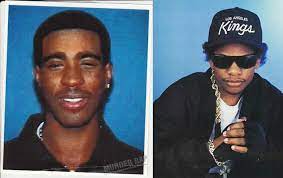Orlando Anderson: The Controversial Figure Linked To Tupac Shakur's Murder
Introduction
Orlando Anderson, a name that has become synonymous with one of the most infamous unsolved cases in music history, continues to intrigue and mystify those who follow the story of Tupac Shakur's murder. While much of the narrative surrounding this case remains speculative, the details that have emerged paint a complex picture of a man whose life was tragically intertwined with one of the darkest moments in the entertainment world. This article delves into the life, actions, and eventual fate of Orlando Anderson, exploring the events that led to his involvement in the Tupac Shakur case.
The Life of Orlando Anderson
Orlando Anderson, often referred to as "Baby Lane," was a member of the South Side Compton gang, a notorious group based in Los Angeles. Known for his involvement in gang-related activities, Anderson's life was marked by violence and criminal behavior. According to public records, Anderson had already been implicated in several violent incidents prior to his association with the Tupac Shakur case.
- On October 2, 1996, Anderson was arrested for the murder of Edward Webb, who was shot dead at a party in April of that year.
- Webb's death was attributed to an attack by "several black males," suggesting gang-related motives.
- Anderson's profile as a gang member placed him at the center of many criminal investigations in Los Angeles during the 1990s.
Connection to Tupac Shakur's Murder
The connection between Orlando Anderson and Tupac Shakur's murder remains a subject of intense debate and speculation. On September 7, 1996, Shakur was fatally shot in a drive-by shooting in Las Vegas. The events leading up to this tragic incident are crucial in understanding Anderson's alleged involvement.
The MGM Grand Incident
In the hours before the shooting, Shakur's entourage reportedly engaged in a brawl with Orlando Anderson at the MGM Grand casino. This altercation is believed to have played a pivotal role in the events that followed. According to witnesses, Shakur's group attacked Anderson, who was a member of a rival gang and the nephew of Duane Keefe D. Davis, a key figure in the investigation.
- The brawl involved multiple individuals and escalated tensions between the two groups.
- Anderson's presence at the scene and his alleged role in the altercation made him a person of interest in the investigation.
Confession and Evidence
A retired police officer later claimed that Anderson confessed to killing Shakur days after his death. This confession, however, remains unverified and has been the subject of much controversy. Additionally, Duane Keefe D. Davis, Anderson's uncle, reportedly confessed to police that it was his nephew who was involved in the shooting.
While these confessions provide some insight into the case, the lack of concrete evidence has left the mystery unresolved. The involvement of gangs and the complex web of relationships in Los Angeles during the 1990s further complicate the investigation.
Orlando Anderson's Death
Orlando Anderson's life came to an abrupt end on June 28, 1998, when he was shot and killed in Los Angeles. His death, occurring barely two years after Shakur's murder, added another layer of mystery to the case. Many speculated that his killing was retaliation for his alleged involvement in Shakur's death, while others suggested it was gang-related.
- Anderson was killed in a drive-by shooting, a method often associated with gang violence.
- His death left many questions unanswered and further obscured the truth behind the Tupac Shakur case.
Legacy and Impact
Orlando Anderson's legacy is one of controversy and speculation. As a central figure in one of the most high-profile unsolved murders in history, his name continues to resonate in discussions about crime, gangs, and the music industry. While much of the evidence against him remains circumstantial, his involvement in the events surrounding Shakur's death cannot be ignored.
Anderson's life and death highlight the pervasive influence of gang violence in urban communities during the 1990s. His story serves as a reminder of the dangers posed by such environments and the need for systemic change to address these issues.
Conclusion
Orlando Anderson's life was marked by violence, crime, and a tragic end. His alleged involvement in the murder of Tupac Shakur remains one of the most intriguing aspects of the case, with confessions and circumstantial evidence pointing to his role. However, the lack of definitive proof leaves the truth elusive, perpetuating the mystery surrounding this infamous case.
In summary:
- Orlando Anderson was a member of the South Side Compton gang and was implicated in several violent incidents.
- He was arrested for the murder of Edward Webb in 1996, further linking him to a life of crime.
- Anderson was allegedly involved in the altercation with Tupac Shakur's entourage at the MGM Grand, leading to his association with Shakur's murder.
- Confessions from both Anderson and his uncle, Duane Keefe D. Davis, have fueled speculation about his involvement.
- Anderson was shot and killed in 1998, two years after Shakur's death, leaving many questions unanswered.
As the world continues to seek answers, Orlando Anderson's story serves as a cautionary tale about the dangers of gang involvement and the lasting impact of unresolved crimes.
- Bollyflix
- Securely Connect Remote Iot Vpc Raspberry Pi Free
- Web Max Hdcom
- Bollyflix Ninja
- Adriana Lima Top Falls During Runway No Blur

Who killed Tupac Shakur? All about prime suspect Orlando Anderson - The

Orlando Anderson - Alchetron, The Free Social Encyclopedia

Orlando Anderson - Wikiwand